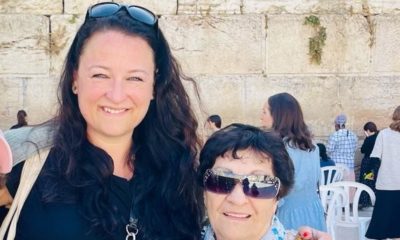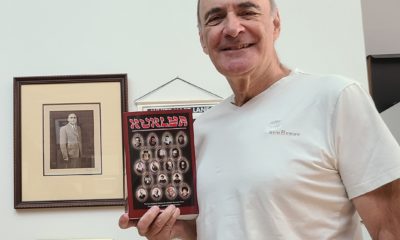
Featured Item

A Zoom gathering of the clan
A family reunion under COVID-19 is certainly a special occasion, but when 53 members across five branches of a family come together after 160 years, the reunion is sure to be memorable.
Such was the case on 1 August 2020 when the descendants of the King and Bloom families gathered over Zoom from homes across four different continents.
South African expat and genealogy enthusiast Joel Levy instigated this reunion, marking the first gathering of descendants from five siblings born in the 1800s. It was the result of years of painstaking research, remarkable discoveries, and a whole lot of effort.
“I always thought I was just a Litvak,” Levy told the SA Jewish Report this week from his home in England. “In fact, I am a descendant of two families who arrived in the United Kingdom (UK) from Poland in 1820, one settling in Bristol, and the other in Wales.
“Why they chose to settle there is beyond me. It certainly wasn’t a popular choice for Eastern European Jews, but it would have a tremendous impact on their descendants.”
Levy has spent the last 40 years tracing the history of these two families, exploring how the Kings and the Blooms merged and proliferated across the 19th and 20th centuries.
The story began when Solomon Bloom moved his family to Wales, at the same time when Moses King settled his clan in Bristol. Married to Ann, King had five children, one of whom would marry Bloom’s son and go on to become Levy’s great-great-great grandmother, Miriam King.
Accounting for the exploits of the four other children has been Levy’s mission for the past two decades.
He explains: “The eldest brother, David, landed up in Missouri, and the younger two brothers, Barnett and Aaron, also ended up in the United States (US). They arrived in Texas in 1855 and, after dealing in décor, established King’s Paints, then the biggest supplier of painting equipment. When the American Civil War broke out in 1862, they had no choice but to fight for the Confederate Army, which is probably something few of us would be proud of.
“Just imagine it: two Jewish boys who know little about America riding on horseback and fighting in a war. It’s not your average part of history.”
Both survived the war and married Lutheran sisters and, although only one of the women converted to Judaism, both their husbands remained devoted Jews who played instrumental roles in their respective Jewish communities, and returned to their family in Wales. All of this was unknown to Levy until he discovered the information in one of the least likely places: A Holy Bible.
“I had no idea about Texas or what happened to those branches of the family,” he says. “I wondered what had become of them. Aaron had eight children and I couldn’t find any trace of them, and though I’d found the graves of Moses and Ann in Newport, I could hardly make out any of the inscriptions.
“Aaron actually kept a family bible, and because he had a Christian wife, he followed the common Christian practice of recording family births and deaths in the front of the bible. He wrote both the English and Hebrew dates and, considering that he married out, this is incredible. He still hung onto his Judaism.”
The bible was discovered in Canada, the result of Aaron’s wife moving there after her husband’s death. It was on its pages that Levy found mention of Moses and Ann (both their names written in Hebrew), as well as other family names and dates.
“I’d searched everywhere and, recorded in a family bible sitting in Canada, was information I could find nowhere else,” says Levy.
Another one of Levy’s fascinating discoveries concerned the antics of the elder Moses King, whose stint as a fence dealing in stolen goods had a considerable impact on his children and their descendants.
“Moses was caught in possession of stolen goods and tried in 1837,” recounts Levy. “He was in his mid-40s already but was found guilty and confined to a prison hulk in Portsmouth before being sent to Tasmania where he was put to work. He even tried to be elected as the local Jewish community’s shamash [shul servant] but received not a single vote.”
Despite his deportation, Moses reoffended and was condemned to serve another 14 years, bringing his sentence to a total of 28 years. Surprisingly, he would return to his family in Wales after his release.
Says Levy: “He could have started a new life, yet he chose to go home and rejoin his wife, a woman who had single-handedly raised her children. When Moses returned, he and Ann relocated to the US so that he could reconnect with his sons there before they returned to live in the UK.
“Think about that: Here was a man who moved from Poland to the UK, sat aboard a prison hulk, went to Australia, came home, reunited with his wife, went to Texas, came back to Wales, and died at the age of 95. To me, that’s extraordinary.”
Eager to share these findings with his fellow King descendants and connect them with one another, Levy was determined to arrange the first family reunion this year. When COVID-19 scuppered plans of an in-person gathering, he decided to gather as many descendants as possible for a Zoom reunion, and contacted his relatives from across the US, Canada, Sweden, Australia, and South Africa.
“I was not expecting people to be interested,” Levy says. “History is not for everyone, and I thought I’d have perhaps 15 people in all. More and more people came onboard as August approached, and in the end, we had 53 people involved, the eldest of whom is 95.”
The reunion was a tremendous success, with descendants discovering their fellow King clansmen (some of whom lived down the road) and some even discovering they were halachically Jewish.
“I’m still overwhelmed,” says Levy. “Since that day, it keeps hitting me just how incredible the whole thing was. I keep getting messages from people saying how meaningful it was, especially under lockdown. Connections have been made, and we’re now all in touch over Facebook.
“I really feel a sense of achievement, and I’m thrilled I could open my ‘family’ up to their heritage, culture and history.”










